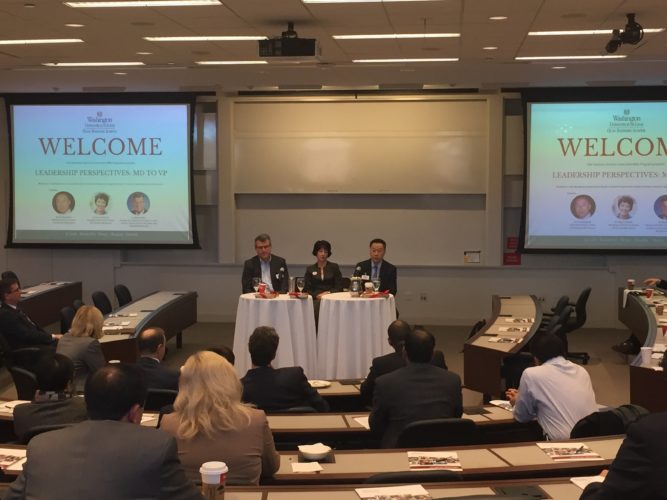The workforce is changing. Gallup estimates millennial turnover costs the U.S. economy $30.5 billion a year. But, is it really a millennial issue or simply a generational issue? And, regardless, as leaders, what we can do about it? How are companies “bridging the gap” in recruitment, employee engagement, and community engagement? These were issues vetted to a standing room only audience at the Charles F. Knight Executive Education Center for the kick-off the of 2017 Leadership Perspectives series.
The forum was moderated by Yemi Akande-Bartsch, Ph.D., president & CEO of FOCUS St. Louis, and panelists included David Karandish, co-founder and chairman, Equity.com; Ann Marr, vice president, Global Human Resources, World Wide Technology, Inc.; Mike Koehler vice president, Human Resources, Express Scripts; and Billie Bright, corporate consultant with Dale Carnegie Training.
“It’s not just the millennial mindset, it’s generational,” shared Koehler. “Each generation has its share of young go-getters who are high achievers. What’s slightly different about this group of go-getters is the access to senior leadership they want, so creating internal forums where senior leaders are present and accessible has provided that opportunity.”
Billie Bright and Ann Marr concurred. And, Marr noted creating internal groups led by senior leaders has proven successful for World Wide Technology. “I chair the women’s group and through the outreach efforts, we’ve seen several women promoted to senior positions. The internal networks provide access to senior leaders and the opportunity to share across the business,” she shared.
Companies, too, are looking to urban areas to recruit and in some cases opening satellite offices. With technology today, working remotely is easier to more acceptable.
David Karandish, a millennial himself, shared millennials want to feel connected, they want meaning. At Answers.com the company he co-founded and successfully sold, millennials were not employees, but team members. “The feeling of belonging, of being part of something is important,” he noted. Now, he’s doing it again with Equity.com.




